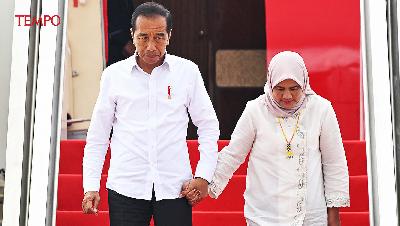Maritime Affairs Ministry
Monday, October 14, 2024
A number of policies from Minister Sakti Wahyu Trenggono are riddled with conflicts of interest. They benefit his son, Indra Trenggono.
arsip tempo : 174577835689.

SAKTI Wahyu Trenggono seems to be following the example of the way President Joko Widodo treated his son, Gibran Rakabuming Raka. While Jokowi smoothed the way for Gibran to become Mayor of Solo and then vice president, the Minister of Maritime Affairs and Fisheries is alleged to have made it easier for his son, Indra Nugroho Trenggono, to succeed in business.
Minister Sakti Wahyu Trenggono did this by reviving a number of policies that had been suspended during the time of Maritime Affairs Minister Susi Pudjiastuti. For example, Wahyu Trenggono restarted operations at Benjina Port in Aru Islands, Maluku, and issued permits for a number of formerly foreign-owned vessels after they had been modified.
The operating permit for Benjina Port, which was managed by Benjina Pusaka Resources, was revoked in 2015 because of human trafficking and illegal fishing, as well as the use of formerly foreign-owned vessels that were damaging the local maritime ecosystem. Despite all of that, two years ago, Wahyu Trenggono decided to designate Benjina as main fishing port.
Minister Wahyu Trenggono designated Benjina, together with the fishing port at Tual, as pilot fishing ports for the measured fishing (PIT) program in June 2024. PIT is a flagship program of the Maritime Affairs Ministry to integrate catching, processing and marketing of fish.
However, when the Minister’s son, Indra Trenggono, maneuvered to take over Benjina port, there were strong indications of conflicts of interest. He used a number of methods, including taking advantage of officials at the Maritime Affairs Ministry, so he was able to buy the right to manage the port from Industri Perikanan Arafura—previously known as Benjina Pusaka Resources.
It is also fair to accuse Minister Wahyu Trenggono of involvement in conflicts of interest when the Maritime Affairs Ministry granted a business and fishing permit to the vessels TMP 51-56 owned by Trinadi Mina Perkasa. The owners of the company established in 2020 include Rino Febrian, son-in-law of State Secretary Minister Negara Pratikno, and Indra Trenggono—through Indo Mina Lestari. This company—owned by the sons of the ministers—is engaged in fishing, the ownership of fishing vessels, and fish exports.
The Maritime Affairs Ministry granted the permit after the owner changed the name of the ships and modified the use of the fishing equipment. The ships use bagged shrimp drag nets, which function like trawl nets because they also scoop up all the fish. Previously, the use of trawl nets is banned because they damage the maritime ecosystem.
During the time of Minister Susi Pudjiastuti, the fishing business permits, and fishing catch permits for these vessels were revoked because they carried out transshipment and smuggling of animals, and did not comply with the rules about foreign workers. They were known as Wogekel motorboats, and were owned by the Dwikarya group.
At present, these ships can be seen operating from the Tual fishing port owned by Samudera Indo Sejahtera, a company owned by Artha Graha boss Tomy Winata.
These kinds of shady dealings should be stopped, especially because misuse of authority and conflicts of interest usually lead to corruption. The law enforcement authorities should investigate this, starting from the series of irregularities relating to the policies of Minister Wahyu Trenggono.











